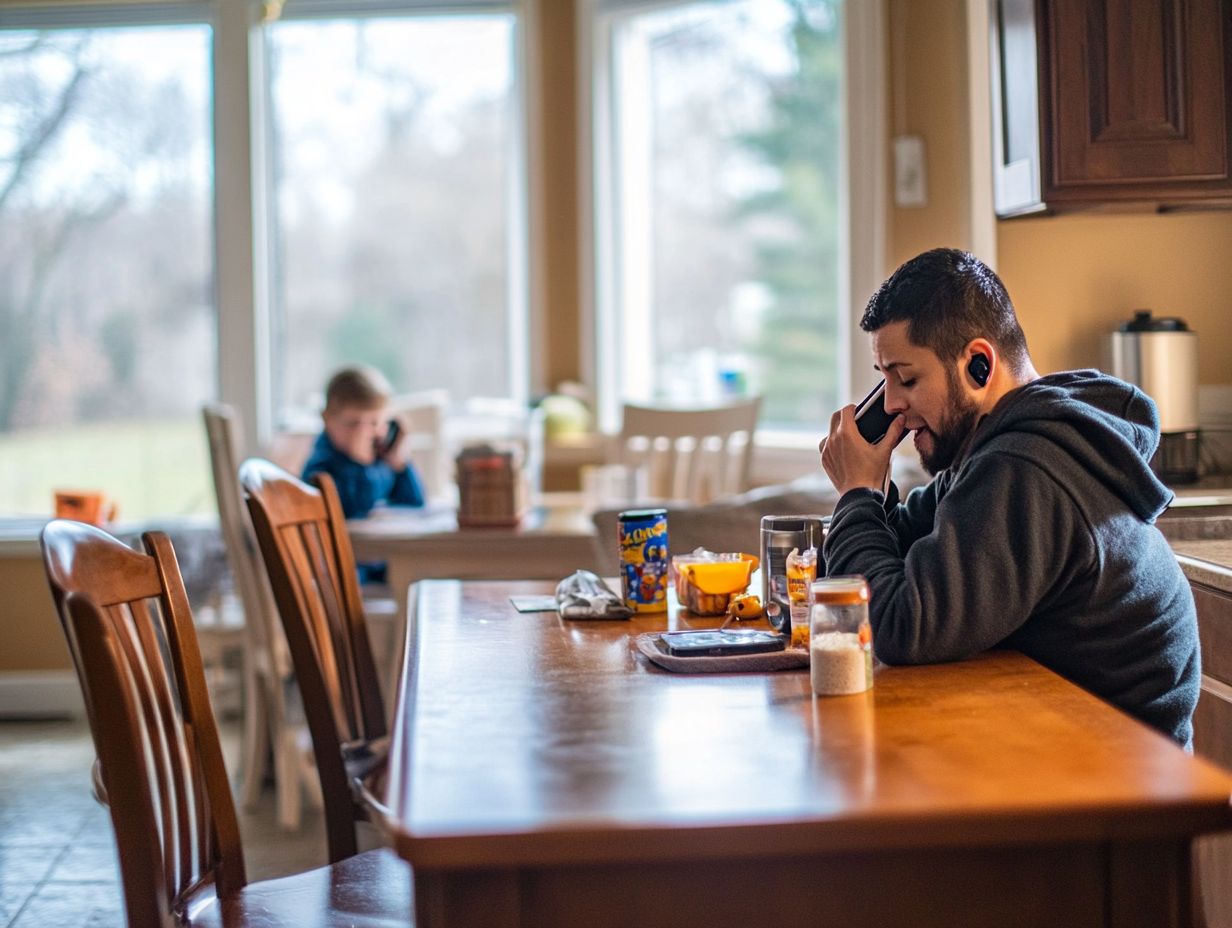How to Communicate When Parenting Alone
Parenting alone is a journey that can be both profoundly rewarding and undeniably daunting, often presenting you with a unique set of challenges and rewards. As a single parent, you find yourself juggling responsibilities while skillfully navigating the intricate emotional landscapes that accompany this role.
Effective communication is essential in this endeavor, serving as the foundation not only for co-parenting arrangements but also for nurturing trust, honesty, and understanding with your children.
In this article, we will explore the challenges single parents face and arm you with effective strategies to overcome them.
Contents
- Key Takeaways:
- The Challenges of Parenting Alone
- Effective Communication Strategies for Single Parents
- Effective Communication Strategies for Single Parents
- How to Communicate with Your Co-Parent
- Communicating with Your Co-Parent
- Communicating with Your Children
- Effective Communication in Parenting
- Frequently Asked Questions
- 1. How can I effectively communicate with my child when I am parenting alone?
- 2. What if my child has trouble opening up to me about their feelings?
- 3. How can I handle disagreements or conflicts with my child in a positive way?
- 4. How can I encourage my child to open up?
- 5. How can I maintain a strong bond with my child while parenting alone?
- 6. What if my child is not responding well to my attempts at communication?
Key Takeaways:

- Set clear boundaries and expectations to effectively communicate as a single parent.
- Establish a co-parenting plan and schedule regular check-ins to maintain healthy communication with your co-parent, fostering mutual respect and shared responsibility.
- Be honest and age-appropriate when communicating with your children, while also encouraging open communication and showing love and support.
The Challenges of Parenting Alone
Parenting alone as a single parent can feel overwhelming. You face unique challenges that significantly affect both your family life and emotional well-being.
Without a co-parent, you often bear the full weight of responsibility for your children s upbringing, which can lead to increased stress and feelings of isolation. Maintaining proper organization and boundaries can help manage these challenges.
Navigating the intricacies of decision-making, discipline, and creating a safe environment for your children can indeed be daunting. Many single parents find it difficult to maintain emotional stability while nurturing meaningful relationships, all while striving for independence, self-sufficiency, and emotional management.
It s essential to cultivate effective coping skills and build a robust support system to navigate these challenges with confidence. Engaging in conflict resolution helps build better family dynamics and contributes to a more balanced family life.
What Are the Main Challenges of Parenting Alone?
The primary challenges of parenting alone often revolve around the emotional and financial pressures that accompany raising children without a partner, influencing both your personal well-being and family dynamics.
You may find yourself grappling with an overwhelming sense of isolation, where the absence of emotional support amplifies feelings of stress and anxiety. Financial instability can further complicate matters, heightening concerns about providing essential resources for your children and making it challenging to create a stable home environment.
As you navigate daily routines, you might struggle to carve out time for yourself, frequently sacrificing self-care to prioritize your children s well-being. These challenges can have a direct impact on your children’s emotional development, as they may pick up on your stress, highlighting the need for strong coping skills and effective problem-solving strategies.
Building a reliable support system becomes essential; not only does it ease the burdens you face, but it also cultivates a healthier emotional atmosphere for everyone involved.
Effective Communication Strategies for Single Parents
Effective communication strategies are crucial for you as a single parent. Navigating the complexities of family life requires a thoughtful approach, ensuring your children s emotional stability while also fostering nurturing relationships.
By honing these skills, you can create a supportive environment that enhances both your well-being and that of your children.
Effective Communication Strategies for Single Parents
1. Set Clear Boundaries and Expectations
Setting clear boundaries and expectations is an essential communication strategy for you as a single parent. It establishes a framework for respectful interactions and discipline within your family.
By creating a safe environment where everyone understands their roles and responsibilities, you can nurture a sense of security that is vital for emotional well-being. Clear expectations act as guidelines that help manage behavior and foster mutual respect among family members. For example, discussing house rules together and involving your children in the rule-making process can lead to better compliance and understanding.
Incorporating simple practices, such as weekly family meetings, can open dialogue about behaviors that need addressing while also providing a platform to celebrate positive actions. This exciting two-way communication reinforces boundaries and encourages consistent positive behavior within your household.
2. Practice Active Listening
Practicing active listening is an essential communication strategy for you as a single parent, building a closer bond with your children and enhancing mutual understanding of each other s feelings and needs.
By employing techniques such as paraphrasing (which means restating what someone has said) and reflecting feelings, you can validate your children s emotions and demonstrate genuine care. Maintaining eye contact during conversations signals attentiveness, reinforcing the sense of safety necessary for open expression.
These practices enhance emotional support and encourage your children to vocalize their thoughts and feelings. When your children feel heard and understood, it cultivates their confidence and emotional resilience, nurturing a familial bond built on trust and connection while fostering positive behavior.
This supportive environment enables them to navigate their emotions more effectively and fosters overall emotional well-being.
3. Use ‘I’ Statements
Utilizing ‘I’ statements is an effective communication strategy for you as a single parent, allowing for a truthful expression of your feelings and needs without casting blame on your children. This approach promotes healthier dialogue.
By embracing ‘I’ statements, you can convey your feelings and concerns in a manner that fosters understanding and respect. For example, rather than saying, “You never listen to me,” you might express, “I feel unheard and frustrated when I try to share my thoughts.” This subtle shift showcases your personal accountability and paves the way for constructive conversations, aiding in effective communication.
Such an approach can significantly diminish defensiveness and miscommunication, creating a supportive environment. Implementing ‘I’ statements can positively impact both your emotional well-being and family dynamics. This practice encourages your children to express their feelings similarly, nurturing empathy and cooperation within your household.
4. Communicate Openly and Honestly

Open and honest communication is essential for you as a single parent. It not only builds trust but also strengthens the family dynamic, creating a safe haven for your children to express their thoughts and emotions freely.
This openness invites your children to voice their feelings while also giving you the opportunity to share your own struggles and triumphs, fostering a deeper emotional connection within your family. By tackling both successes and challenges together, you cultivate resilience, encouraging each family member to support one another during difficult times.
Such transparent conversations enhance emotional well-being, allowing your children to feel secure and understood while nurturing an atmosphere where trust and understanding flourish. These dialogues encourage shared love and mutual healing within the family.
By maintaining this honesty, you ensure a nurturing environment, reinforcing your role as both nurturer and guide in your children s lives.
Try implementing at least one of these strategies today to improve your communication and strengthen your family bonds!
5. Be Flexible and Willing to Compromise
Flexibility and a willingness to compromise are crucial traits for you as a single parent when navigating the complexities of family life and communication. This adaptability enhances your ability to solve problems collaboratively and fosters a nurturing environment where your children feel valued and heard.
By embracing change and remaining open to various viewpoints, you model effective communication skills. This reinforces the significance of trust and mutual respect within your family dynamic. Such an approach cultivates emotional stability, enabling all family members to address conflicts constructively rather than defensively.
This flexibility leads to stronger bonds and healthier relationships. Everyone learns to navigate challenges together, creating a supportive atmosphere that benefits your entire family unit.
6. Seek Outside Support
Don’t hesitate to seek outside support it’s a smart move every single parent should consider! This active communication approach significantly enhances your emotional stability while providing invaluable resources to help manage parenting challenges.
By reaching out to friends, family, or professional counselors, you can build a robust support system essential for navigating the complexities of co-parenting. These resources improve your communication skills and equip you with vital coping mechanisms, fostering healthier relationships with your children and supporting their childhood development.
Engaging with trusted friends can spark meaningful conversations, while involving family cultivates a strong sense of community. Professional counseling offers specialized insights tailored to your unique co-parenting dynamics, allowing you to prioritize your emotional well-being alongside your children’s best interests.
How to Communicate with Your Co-Parent
Effective communication with a co-parent is essential for fostering a healthy co-parenting relationship. By engaging in open and constructive dialogue, you can work collaboratively to meet your children’s needs, establish clear boundaries, and adeptly navigate the complexities that arise from shared responsibilities. This strengthens your partnership and creates a stable environment for your children to thrive.
1. Establish a Co-Parenting Plan
Establishing a co-parenting plan is crucial for effective communication. It provides a solid framework for organizing responsibilities and maintaining accountability to each other and your children, ensuring emotional stability.
This plan should clearly outline the parenting schedules, specifying where the children will be on particular days and how holidays will be divided. It s essential to set expectations regarding behavior, discipline, and engagement for a unified approach even while living separately.
Clearly assign responsibilities such as who manages school pickups, medical appointments, and decision-making to cultivate a sense of teamwork and minimize misunderstandings.
Ultimately, a well-structured co-parenting plan acts as a blueprint for improved collaboration, reducing conflicts while keeping the children’s best interests at the forefront.
2. Schedule Regular Check-Ins
Scheduling regular check-ins between you and your co-parent is essential for fostering open communication. It ensures you both remain aligned in your shared commitment to your children’s needs and emotional well-being, maintaining a consistent support system for them.
Use this time to review your children s progress, tackle any issues, and adjust the co-parenting plan as circumstances evolve. It creates a safe space for both of you to express concerns and celebrate milestones, reinforcing your partnership in raising happy, healthy kids.
Consistent communication alleviates misunderstandings and cultivates a supportive environment prioritizing your children s emotional well-being. By engaging in these conversations regularly, you can effectively navigate challenges, foster stability, and promote a nurturing atmosphere that benefits your children s development and happiness.
Communicating with Your Co-Parent
3. Keep Emotions in Check
Keeping your emotions in check during discussions with a co-parent is essential for effective communication and resolving conflicts. This approach allows both of you to concentrate on your children’s needs and maintain mutual respect.
Incorporating strategies like taking regular breaks during heated conversations can create a necessary buffer that prevents emotions from boiling over. This pause provides an opportunity for reflection and managing emotions, helping you regain your composure so that you can re-enter the discussion with a clearer mindset.
Reframing the conversation towards constructive topics can foster trust and respect, steering the focus away from personal grievances and toward shared goals. These methods enhance your emotional control and nurture a healthier co-parenting relationship, ensuring that both of you remain aligned in prioritizing your children’s well-being.
4. Focus on the Children’s Needs

Your primary objective in co-parenting communication should be to prioritize your children’s needs. This ensures that both you and your co-parent remain united in your shared love and dedication to providing emotional support for your kids.
By placing your children’s well-being above personal disagreements, you create a stable environment that nurtures healthy emotional development. This collaborative approach alleviates stress for the children and reinforces their sense of security and belonging.
By working together and keeping communication channels open, you can offer invaluable emotional support, enabling your children to thrive despite the challenges that come with co-parenting. This also sets a positive example for problem-solving.
Ultimately, focusing on this shared goal strengthens your co-parenting relationship, fostering a positive atmosphere that significantly benefits your children’s overall growth and development.
5. Consider Counseling or Mediation
Counseling or mediation can be invaluable resources for co-parents aiming to elevate communication and resolve conflicts. These professional services offer expert guidance on managing emotions, coping skills, and effective strategies tailored to your needs.
In these supportive environments, you ll find a neutral space to express your feelings and concerns without worrying about escalation. By participating in structured discussions led by professionals, you ll gain essential communication skills that help cultivate a healthier partnership and strengthen family dynamics.
This method encourages active listening and fosters understanding and empathy, making it easier for you to navigate parenting challenges together. Engaging in such support can lead to more harmonious co-parenting dynamics, significantly enhancing the overall well-being of both you and your children.
Communicating with Your Children
Communicating effectively with your children is vital for nurturing emotional support, building trust, and strengthening the parent-child bond. This practice enriches your relationship and plays a crucial role in their overall development and emotional well-being.
1. Be Honest and Age-Appropriate
Being honest and age-appropriate in your communication with children is essential for fostering trust and promoting their emotional well-being. It allows them to grasp their circumstances in a relatable way that respects their unique perspectives.
As you convey information, consider the child’s age level. Younger children may struggle to fully understand complex ideas or emotions. For example, when discussing sensitive topics, using simpler language can enable them to process their feelings without feeling overwhelmed.
Transparency is vital; it lays a strong foundation of trust and emotional stability. Engaging in honest dialogue reassures children that they are valued and heard, equipping them with the skills they need to navigate their own emotions effectively.
Open communication nurtures a secure environment where children can thrive emotionally and develop resilient coping strategies.
Effective Communication in Parenting
2. Listen and Validate Their Feelings
Listening to and validating children’s feelings are vital components of effective communication. This approach not only demonstrates emotional support but also fosters a deeper bond between you and your child.
By engaging in active listening, you create a safe space where your child can comfortably express their emotions without the fear of judgment. Techniques like maintaining eye contact, nodding in understanding, and paraphrasing their thoughts can significantly enhance this connection.
When you take the time to summarize how your child feels, it validates their emotions and reassures them that they are truly being heard. This also aids in building their skills to handle emotions.
This practice encourages open dialogue, allowing your child to develop a secure attachment that is crucial for healthy emotional growth. In doing so, you are not only promoting a supportive environment but also reinforcing trust and understanding in your relationship.
This practice helps children develop problem-solving and coping skills.
3. Encourage Open Communication
Encouraging open communication with children is essential for enhancing their emotional well-being and fostering a strong connection. It allows them to express themselves freely and feel truly valued. This practice is a cornerstone of nurturing relationships.
Creating an environment where children feel safe to share their thoughts and feelings can significantly strengthen this bond. It’s crucial that you approach conversations with an open mind and genuine interest in what they have to say, recognizing and respecting their unique perspectives.
By being approachable, you invite children to share their experiences without fear of judgment. Simple strategies, like setting aside regular time for discussions, actively listening, and reinforcing that all feelings are valid, contribute to a nurturing atmosphere.
Establishing trust in this manner promotes deeper emotional connections. This lays a foundation where children can thrive, both personally and relationally. Additionally, it fosters the development of positive behavior and life skills.
4. Show Love and Support
Showing love and support to children is crucial! It boosts their emotional well-being and enhances family dynamics through positive interactions. It also plays a vital role in helping them become independent and self-sufficient.
Verbal affirmations are integral to this nurturing process; simple phrases like “I believe in you” or “You make me proud” can uplift a child’s spirit and significantly boost their self-esteem.
Spending quality time together whether it’s through shared meals, engaging in hobbies, or simply talking about their day fosters a deep sense of connection that strengthens bonds and provides positive attention.
Physical affection, such as hugs and gentle touches, further solidifies these feelings of security and warmth. By prioritizing these expressions of love and support, you can cultivate an environment where emotional health flourishes, ensuring that every family member feels valued and understood.
This also supports emotional stability and effective communication within the family.
Frequently Asked Questions

Understanding family dynamics and the importance of communication can greatly enhance your ability to navigate single parenthood.
1. How can I effectively communicate with my child when I am parenting alone?
Effective communication is essential in maintaining a strong parent-child bond.
It is important to set aside quality time for one-on-one communication with your child. This can be during meal times, before bed, or even during a daily walk. Make sure to listen actively and engage in open and honest dialogue.
Incorporating positive attention and emotional management into your interactions can strengthen your relationship. Effective communication skills are essential for a healthy family life, especially for a single parent.
2. What if my child has trouble opening up to me about their feelings?
Create a safe and non-judgmental space for your child to express themselves. Let them know that their feelings are valid and encourage them to share by asking open-ended questions, such as “How are you feeling about this?” or “Can you tell me more about that?” This promotes emotional stability and helps in nurturing relationships.
Start today! Your child needs your support more than ever.
3. How can I handle disagreements or conflicts with my child in a positive way?
Conflict resolution strategies are crucial for maintaining harmony in family life.
When dealing with conflicts, it is important to stay calm. Avoid getting defensive or angry. Try to see things from your child’s perspective and communicate your thoughts and feelings in a respectful manner.
Use “I” statements and avoid blaming or shaming. Effective conflict resolution skills and mutual respect are key to positive behavior outcomes.
4. How can I encourage my child to open up?
This could be a sign that your child needs emotional support and better ways to talk.
If your child is not communicating with you, it may mean they are struggling with something. Be patient and try to create a comfortable and safe environment for them to share.
Consider seeking professional help sooner rather than later for the best support. A counselor can assist with communication. Dr. Jill Gross from Seattle often emphasizes the importance of emotional support, which means being there for your child emotionally, listening to their feelings, and helping them through tough times.
5. How can I maintain a strong bond with my child while parenting alone?
Make sure to spend quality time together, even if it’s just for a few minutes each day.
Plan fun activities and outings that you can enjoy together. Show your child love and affection through hugs, praise, and encouragement. These small moments can create a powerful bond and promote a nurturing relationship that is crucial in single-parent family dynamics.
6. What if my child is not responding well to my attempts at communication?
Consider collaborating with a professional to develop a parenting plan and improve communication skills.
It is important to understand that every child is different and may have various ways of communicating. If your child is not responding well, try different approaches and be patient.
Remember to lead by example and show them effective communication skills through your actions. Having clear family rules and consistent behavior guidelines can help in setting expectations and fostering responsibility.






